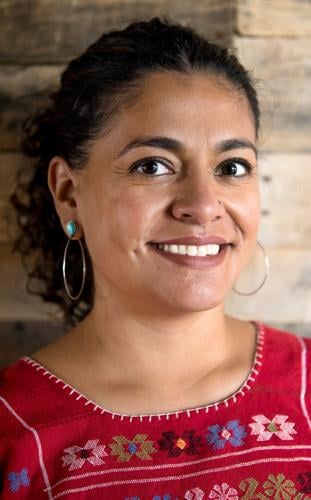Tucson’s policies have long included terms like councilman, policeman and other “gendered language” that some say excludes large segments of the city’s population, but a recent push by top officials has begun the process of changing that.
Councilmembers Lane Santa Cruz and Karin Uhlich spearheaded the move to only use “gender neutral” terms — like “them” rather than “him” — in Tucson’s City Charter, codes and other legal documents.
Tucson City Council Member Lane Santa Cruz
The council unanimously approved a citywide review of those terms at a recent meeting, saying the action is an important step toward inclusivity.
“Language is powerful and it’s something that also evolves with the times,” said Santa Cruz, who added that her proposal was “thanks to the activism” of the LGBTQ community to promote the use of “language that is inclusive.”
Numerous examples of gendered language exist in Tucson’s laws, the most common being the word “him.” City Attorney Mike Rankin said those terms are mainly found in policies that “have been around for a longer period of time.”
Ahead of the council meeting, city staff sorted through over 500 instances of gendered language in the city code alone. The review was only beginning and the entire process is expected to take at least six months.
Council member Karin Uhlich.
There won’t be any significant costs to making the changes and it won’t involve overhauling the legislation all at once. It will instead be a gradual process where language is changed in policies that are already being adjusted for unrelated reasons, such as zoning updates.
“It’s not as if the city’s coming to a grinding halt to make these changes,” Councilmember Steve Kozachik said. “If it’s in front of you and you’re making changes to the other language anyway, then update this language.”
The process will work in two different ways depending on what type of city document is being amended.
Codes and policies will be the easiest to change because it only requires the council’s approval. Officials have already made some gender-neutral changes to those types of documents through run-of-the-mill updates to things like construction regulations.
Changing the Tucson City Charter, which lays out the makeup and function of governing bodies like the city council, is a far heavier lift that would require voter approval of each adjustment.
Charter adjustments will be made through ballot measures that crop up in future election cycles. Such initiatives could involve anything from transportation taxes to drug legalization, which will just have to contain gender-neutral language when they’re put up for voter approval.
The thought is that piece by piece, gendered language will be reviewed throughout the charter without putting forward any ballot measure designed specifically to address the issue.
Tucson Pride, a local LGBTQ activist group, applauded the council’s recent decision. Stephen Myers-Fulgham, the group’s president, said the move was “part of a long-existing, broader effort by the city of Tucson to ensure that a culture of acceptance and inclusion continues to exist in our community.”
Uhlich echoed that sentiment ahead of the council’s vote by saying the matter is more important than it may seem at first glance.
“This is the kind of effort that can often just be brushed off as something that doesn’t really matter,” Uhlich said. “I think that comes from a place of privilege often times — including myself —taking for granted that it doesn’t hurt to use gendered language when, in fact, I know that it does.”
There’s no current effort to adjust the gendered language in legislation for Pima County, according to county communications manager Mark Evans.







